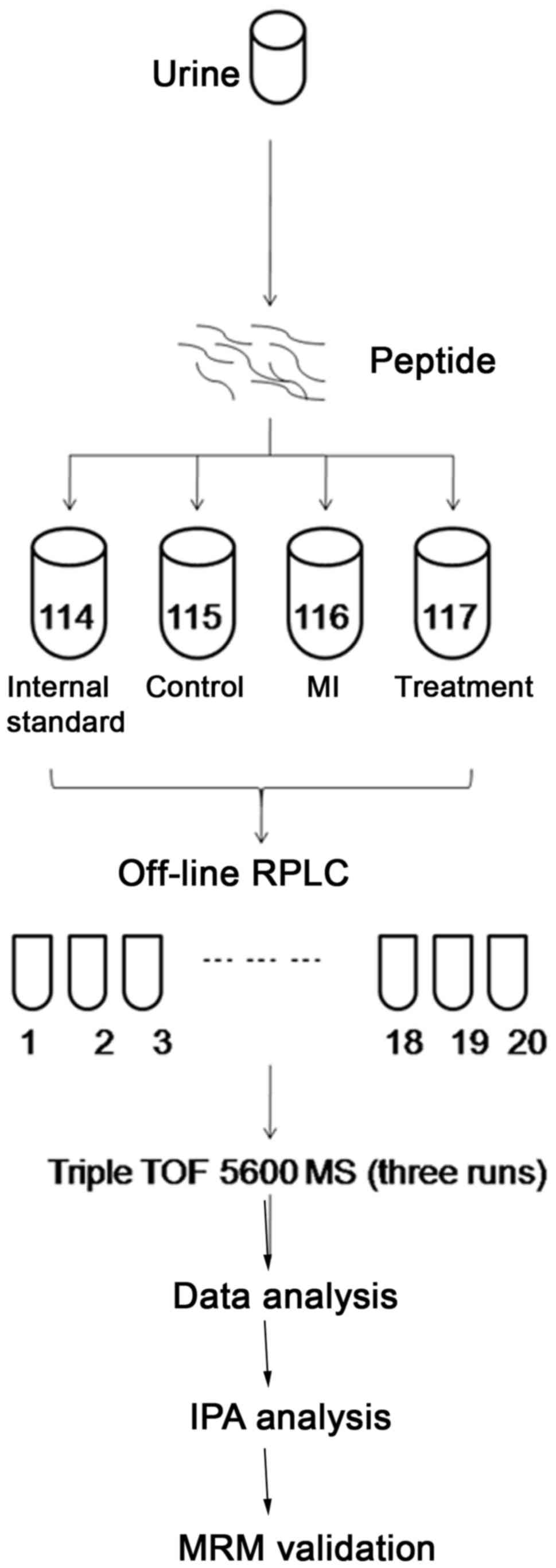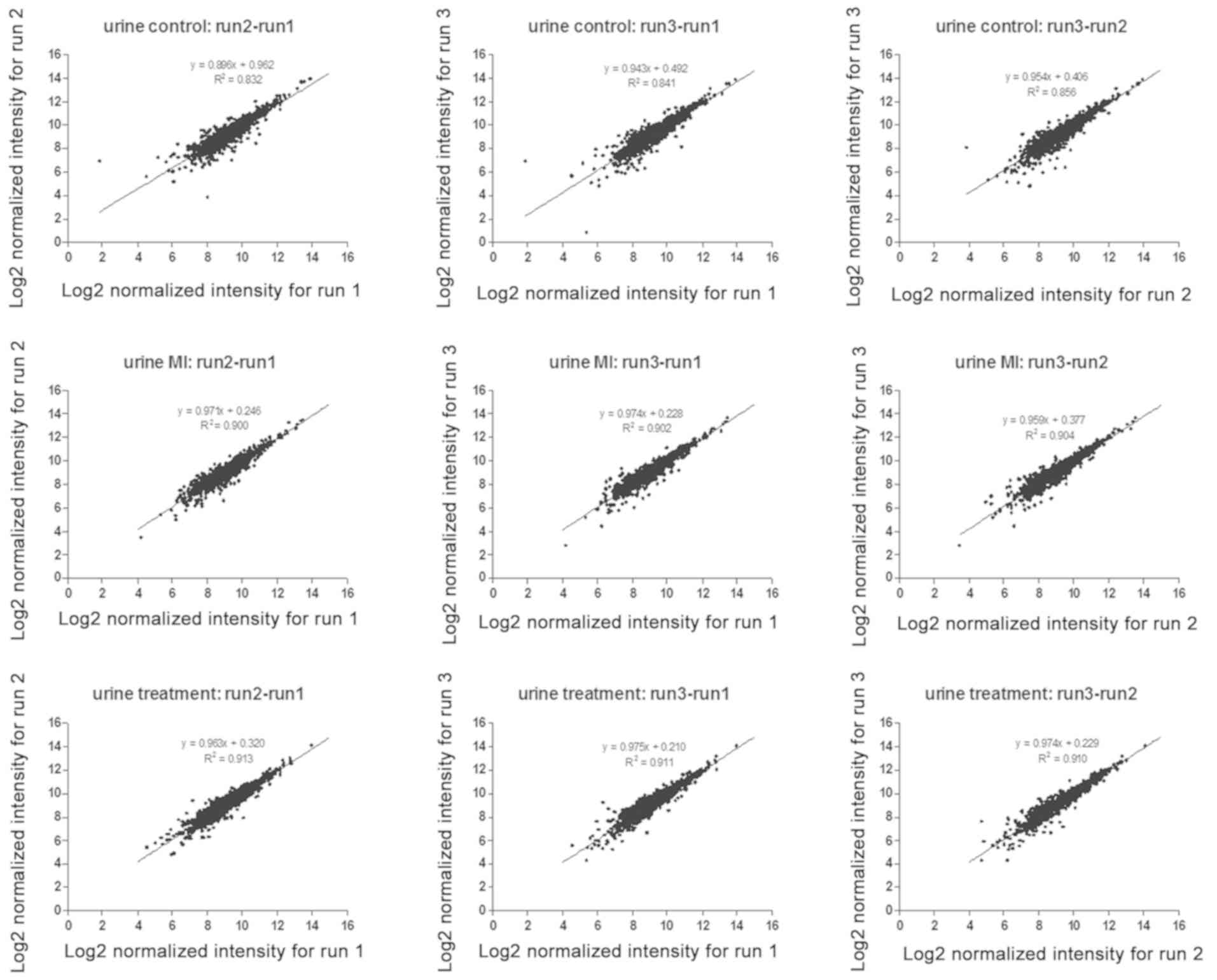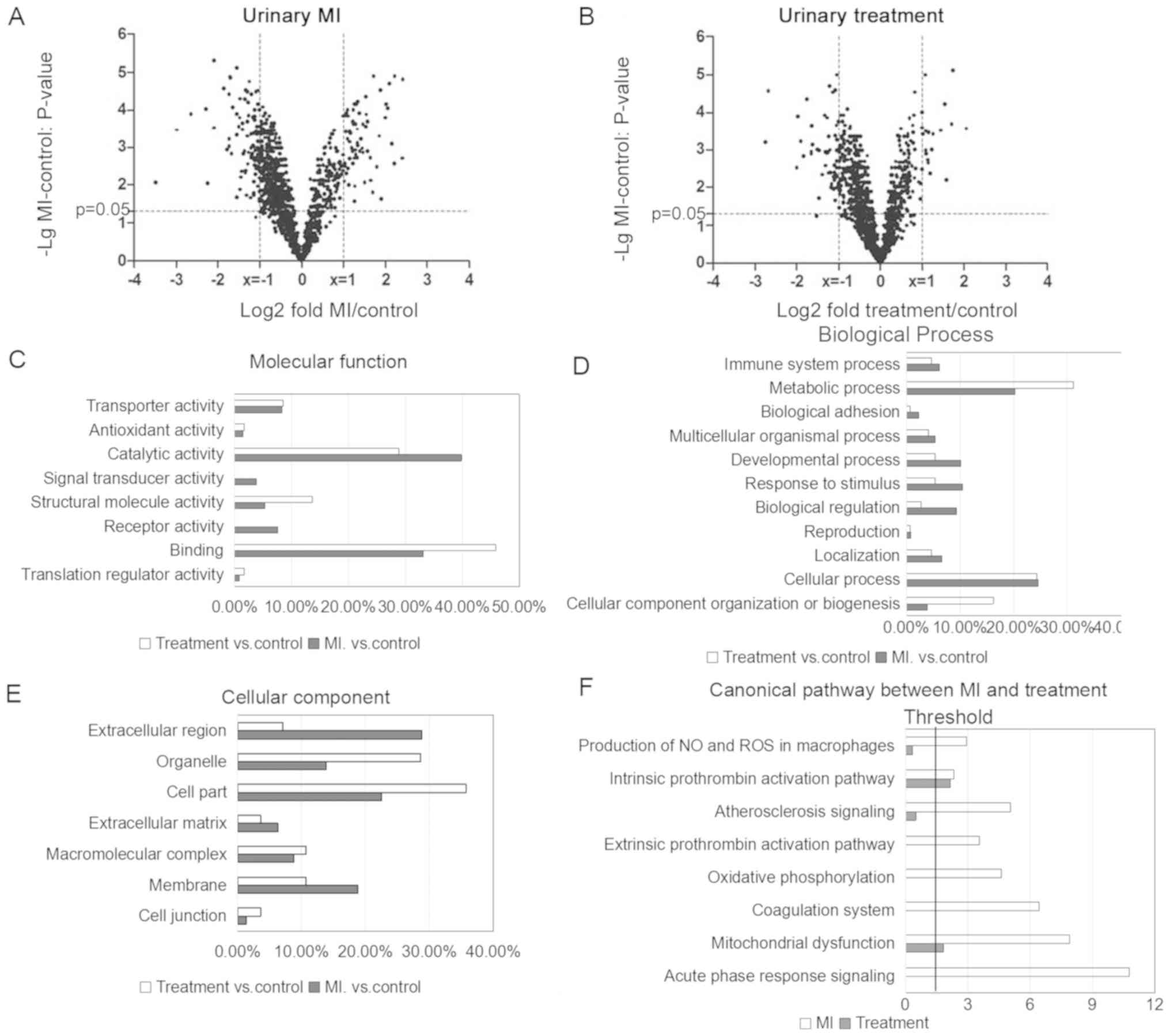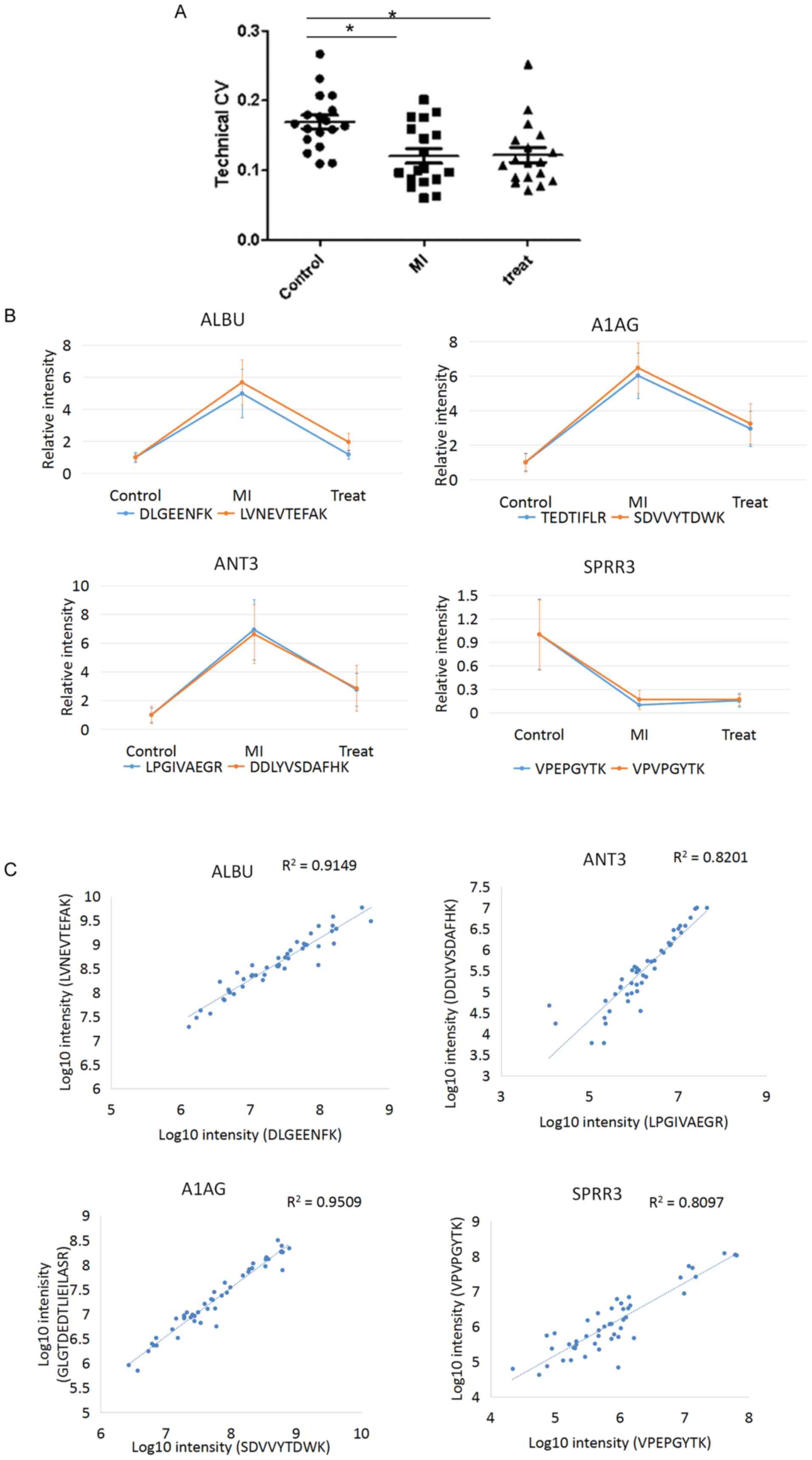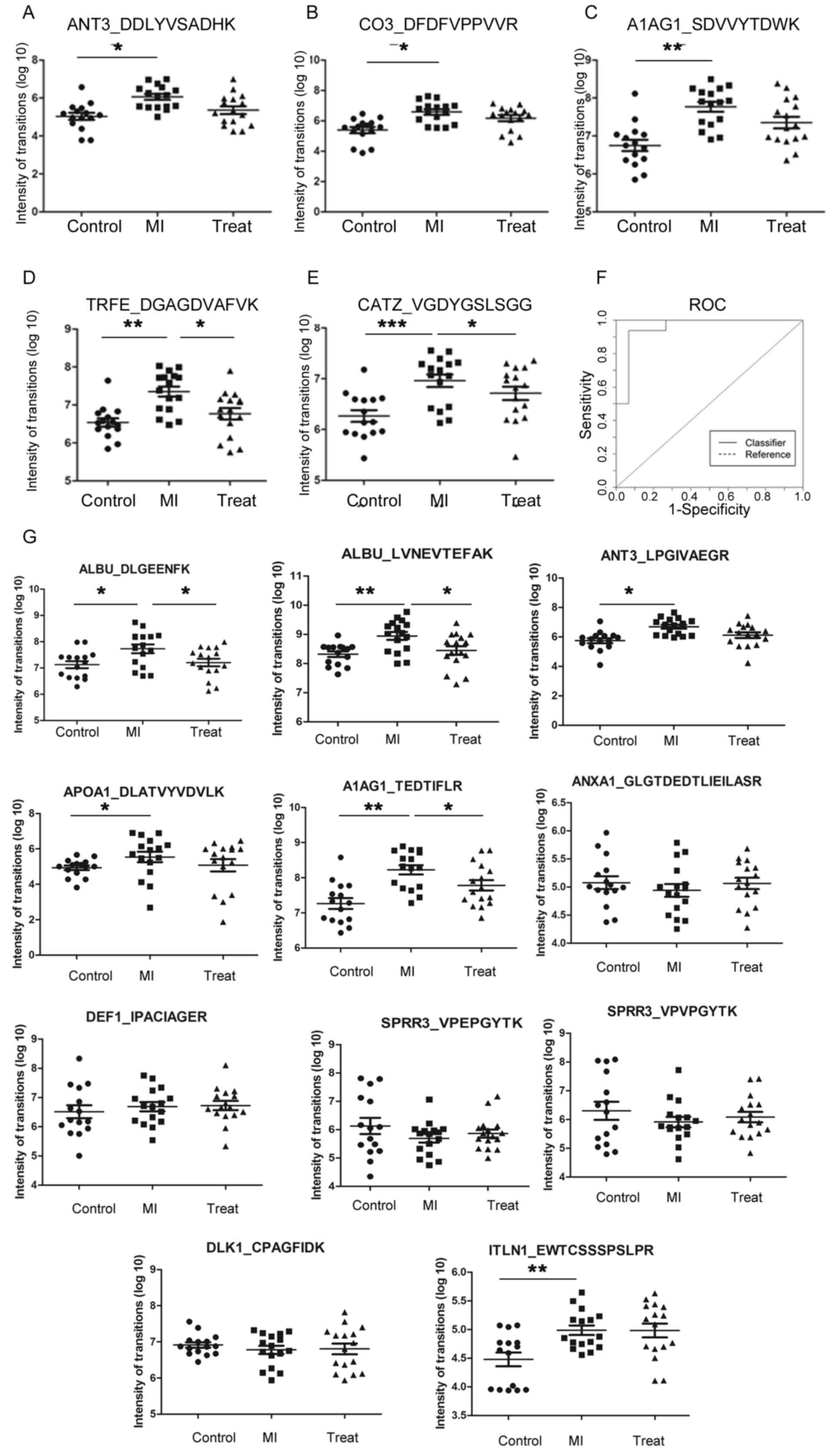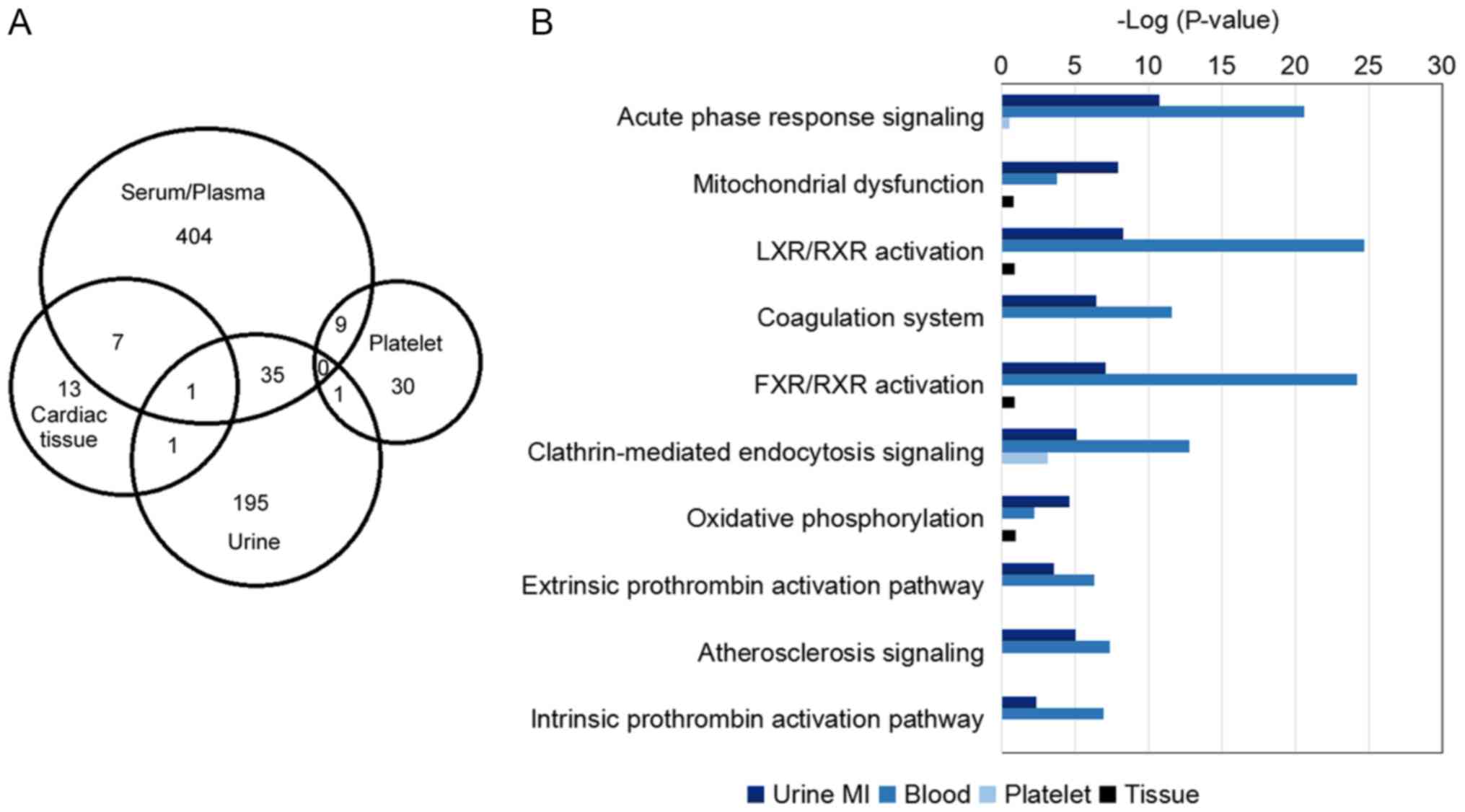|
1
|
Cabello JB, Burls A, Emparanza JI, Bayliss
S and Quinn T: Oxygen therapy for acute myocardial infarction.
Cochrane Database Syst Rev. CD0071602013.doi:
10.1002/14651858.CD007160.pub3. PubMed/NCBI
|
|
2
|
Task Force on the management of ST-segment
elevation acute myocardial infarction of the European Society of
Cardiology (ESC); Steg PG, James SK, Atar D, Badano LP,
Blomstrom-Lundqvist C, Borger MA, Di Mario C, Dickstein K, Ducrocq
G, et al: ESC Guidelines for the management of acute myocardial
infarction in patients presenting with ST-segment elevation. Eur
Heart J. 33:2569–2619. 2012. View Article : Google Scholar : PubMed/NCBI
|
|
3
|
Wang Y, Guo Z and Huang L: Value of
different biochemical markers in early diagnosis of acute
myocardial infarction. Nan Fang Yi Ke Da Xue Xue Bao. 34:1347–1350.
2014.(In Chinese). PubMed/NCBI
|
|
4
|
Kitamura M, Hata N, Takayama T, Hirayama
A, Ogawa M, Yamashina A, Mera H, Yoshino H, Nakamura F and Seino Y:
High-sensitivity cardiac troponin T for earlier diagnosis of acute
myocardial infarction in patients with initially negative troponin
T test-comparison between cardiac markers. J Cardiol. 62:336–342.
2013. View Article : Google Scholar : PubMed/NCBI
|
|
5
|
Paixao AR and de Lemos JA: Acute troponin
elevation and the classification of myocardial infarction. JAMA.
312:2032–2033. 2014. View Article : Google Scholar : PubMed/NCBI
|
|
6
|
Eisenman A: Troponin assays for the
diagnosis of myocardial infarction and acute coronary syndrome:
Where do we stand? Expert Rev Cardiovasc Ther. 4:509–514. 2006.
View Article : Google Scholar : PubMed/NCBI
|
|
7
|
Azzalini L, Candilio L, McCullough PA and
Colombo A: Current risk of contrast-induced acute kidney injury
after coronary angiography and intervention: A reappraisal of the
literature. Can J Cardiol. 33:1225–1228. 2017. View Article : Google Scholar : PubMed/NCBI
|
|
8
|
Ghatge M, Nair J, Sharma A and Vangala RK:
Integrative gene ontology and network analysis of coronary artery
disease associated genes suggests potential role of ErbB pathway
gene EGFR. Mol Med Rep. 17:4253–4264. 2018.PubMed/NCBI
|
|
9
|
Guo Y, Cui L and Jiang S, Zhang A and
Jiang S: Proteomics of acute heart failure in a rat post-myocardial
infarction model. Mol Med Rep. 16:1946–1956. 2017. View Article : Google Scholar : PubMed/NCBI
|
|
10
|
Marshall J, Kupchak P, Zhu W, Yantha J,
Vrees T, Furesz S, Jacks K, Smith C, Kireeva I, Zhang R, et al:
Processing of serum proteins underlies the mass spectral
fingerprinting of myocardial infarction. J Proteome Res. 2:361–372.
2003. View Article : Google Scholar : PubMed/NCBI
|
|
11
|
Parguina AF, Grigorian-Shamagian L, Agra
RM, Lopez-Otero D, Rosa I, Alonso J, Teijeira-Fernandez E,
Gonzalez-Juanatey JR and Garcia A: Variations in platelet proteins
associated with ST-elevation myocardial infarction: Novel clues on
pathways underlying platelet activation in acute coronary
syndromes. Arterioscler Thromb Vasc Biol. 31:2957–2964. 2011.
View Article : Google Scholar : PubMed/NCBI
|
|
12
|
Cubedo J, Ramaiola I, Padro T,
Martin-Yuste V, Sabate-Tenas M and Badimon L: High-molecular-weight
kininogen and the intrinsic coagulation pathway in patients with de
novo acute myocardial infarction. Thromb Haemost. 110:1121–1134.
2013. View Article : Google Scholar : PubMed/NCBI
|
|
13
|
Májek P, Reicheltova Z, Suttnar J, Maly M,
Oravec M, Pečánková K and Dyr JE: Plasma proteome changes in
cardiovascular disease patients: Novel isoforms of apolipoprotein
A1. J Transl Med. 9:842011. View Article : Google Scholar : PubMed/NCBI
|
|
14
|
Addona TA, Shi X, Keshishian H, Mani DR,
Burgess M, Gillette MA, Clauser KR, Shen D, Lewis GD, Farrell LA,
et al: A pipeline that integrates the discovery and verification of
plasma protein biomarkers reveals candidate markers for
cardiovascular disease. Nat Biotechnol. 29:635–643. 2011.
View Article : Google Scholar : PubMed/NCBI
|
|
15
|
Kakimoto Y, Ito S, Abiru H, Kotani H,
Ozeki M, Tamaki K and Tsuruyama T: Sorbin and SH3 domain-containing
protein 2 is released from infarcted heart in the very early phase:
Proteomic analysis of cardiac tissues from patients. J Am Heart
Assoc. 2:e0005652013. View Article : Google Scholar : PubMed/NCBI
|
|
16
|
Keshishian H, Burgess MW, Gillette MA,
Mertins P, Clauser KR, Mani DR, Kuhn EW, Farrell LA, Gerszten RE
and Carr SA: Multiplexed, quantitative workflow for sensitive
biomarker discovery in plasma yields novel candidates for early
myocardial injury. Mol Cell Proteomics. 14:2375–2393. 2015.
View Article : Google Scholar : PubMed/NCBI
|
|
17
|
Zimmerli LU, Schiffer E, Zurbig P, Good
DM, Kellmann M, Mouls L, Pitt AR, Coon JJ, Schmieder RE, Peter KH,
et al: Urinary proteomic biomarkers in coronary artery disease. Mol
Cell Proteomics. 7:290–298. 2008. View Article : Google Scholar : PubMed/NCBI
|
|
18
|
Delles C, Schiffer E, von Zur Muhlen C,
Peter K, Rossing P, Parving HH, Dymott JA, Neisius U, Zimmerli LU,
Snell-Bergeon JK, et al: Urinary proteomic diagnosis of coronary
artery disease: Identification and clinical validation in 623
individuals. J Hypertens. 28:2316–2322. 2010. View Article : Google Scholar : PubMed/NCBI
|
|
19
|
von Zur Muhlen C, Schiffer E, Zuerbig P,
Kellmann M, Brasse M, Meert N, Vanholder RC, Dominiczak AF, Chen
YC, Mischak H, et al: Evaluation of urine proteome pattern analysis
for its potential to reflect coronary artery atherosclerosis in
symptomatic patients. J Proteome Res. 8:335–345. 2009. View Article : Google Scholar : PubMed/NCBI
|
|
20
|
von zur Muhlen C, Schiffer E, Sackmann C,
Zurbig P, Neudorfer I, Zirlik A, Htun N, Iphöfer A, Jänsch L,
Mischak H, et al: Urine proteome analysis reflects atherosclerotic
disease in an ApoE-/- mouse model and allows the discovery of new
candidate biomarkers in mouse and human atherosclerosis. Mol Cell
Proteomics. 11:M111.0138472012. View Article : Google Scholar : PubMed/NCBI
|
|
21
|
Ganz W: The thrombolysis in myocardial
infarction (TIMI) trial. N Engl J Med. 313:10181985. View Article : Google Scholar : PubMed/NCBI
|
|
22
|
World Medical Association, . World Medical
Association Declaration of Helsinki ethical principles for medical
research involving human subjects. JAMA. 310:2191–2194. 2013.
View Article : Google Scholar : PubMed/NCBI
|
|
23
|
Wisniewski JR, Zougman A, Nagaraj N and
Mann M: Universal sample preparation method for proteome analysis.
Nat Methods. 6:359–362. 2009. View Article : Google Scholar : PubMed/NCBI
|
|
24
|
Mi H, Huang X, Muruganujan A, Tang H,
Mills C, Kang D and Thomas PD: PANTHER version 11: Expanded
annotation data from Gene Ontology and Reactome pathways, and data
analysis tool enhancements. Nucleic Acids Res. 45:D183–D189. 2017.
View Article : Google Scholar : PubMed/NCBI
|
|
25
|
MacLean B, Tomazela DM, Shulman N,
Chambers M, Finney GL, Frewen B, Kern R, Tabb DL, Liebler DC and
MacCoss MJ: Skyline: An open source document editor for creating
and analyzing targeted proteomics experiments. Bioinformatics.
26:966–968. 2010. View Article : Google Scholar : PubMed/NCBI
|
|
26
|
Cubedo J, Padro T and Badimon L:
Coordinated proteomic signature changes in immune response and
complement proteins in acute myocardial infarction: The implication
of serum amyloid P-component. Int J Cardiol. 168:5196–5204. 2013.
View Article : Google Scholar : PubMed/NCBI
|
|
27
|
Mateos-Caceres PJ, Garcia-Méndez A, López
Farré A, Macaya C, Núñez A, Gomez J, Alonso-Orgaz S, Carrasco C,
Burgos ME, de Andres R, et al: Proteomic analysis of plasma from
patients during an acute coronary syndrome. J Am Coll Cardiol.
44:1578–1583. 2004. View Article : Google Scholar : PubMed/NCBI
|
|
28
|
Kiernan UA, Nedelkov D and Nelson RW:
Multiplexed mass spectrometric immunoassay in biomarker research: A
novel approach to the determination of a myocardial infarct. J
Proteome Res. 5:2928–2934. 2006. View Article : Google Scholar : PubMed/NCBI
|
|
29
|
Rezeli M, Végvári Á, Donnarumma F, Gidlöf
O, Smith JG, Erlinge D and Marko-Varga G: Development of an MRM
assay panel with application to biobank samples from patients with
myocardial infarction. J Proteomics. 87:16–25. 2013. View Article : Google Scholar : PubMed/NCBI
|
|
30
|
Peronnet E, Becquart L, Poirier F,
Cubizolles M, Choquet-Kastylevsky G and Jolivet-Reynaud C:
SELDI-TOF MS analysis of the Cardiac Troponin I forms present in
plasma from patients with myocardial infarction. Proteomics.
6:6288–6299. 2006. View Article : Google Scholar : PubMed/NCBI
|
|
31
|
Cubedo J, Padro T, Garcia-Moll X, Pinto X,
Cinca J and Badimon L: Proteomic signature of Apolipoprotein J in
the early phase of new-onset myocardial infarction. J Proteome Res.
10:211–220. 2011. View Article : Google Scholar : PubMed/NCBI
|
|
32
|
Dong SY, Sun XN, Zeng Q, Xu Y, Sun J and
Ma LH: Proteomic analysis of adverse outcomes in patients with
acute coronary syndromes. Clin Chim Acta. 416:60–66. 2013.
View Article : Google Scholar : PubMed/NCBI
|
|
33
|
Fawcett T: An Introduction to ROC
Analysis. Pattern Recognition Lett. 27:861–874. 2006. View Article : Google Scholar
|
|
34
|
Guo Z, Wang Z, Lu C, Yang S, Sun H, Reziw,
Guo Y, Sun W and Yue H: Analysis of the differential urinary
protein profile in IgA nephropathy patients of Uygur ethnicity. BMC
Nephrol. 19:3582018. View Article : Google Scholar : PubMed/NCBI
|
|
35
|
Chistiakov DA, Orekhov AN and Bobryshev
YV: ApoA1 and ApoA1-specific self-antibodies in cardiovascular
disease. Lab Invest. 96:708–718. 2016. View Article : Google Scholar : PubMed/NCBI
|
|
36
|
Arques S: Human serum albumin in
cardiovascular diseases. Eur J Intern Med. 52:8–12. 2018.
View Article : Google Scholar : PubMed/NCBI
|
|
37
|
Porez G, Gross B, Prawitt J, Gheeraert C,
Berrabah W, Alexandre J, Staels B and Lefebvre P: The hepatic
orosomucoid/α1-acid glycoprotein gene cluster is regulated by the
nuclear bile acid receptor FXR. Endocrinology. 154:3690–3701. 2013.
View Article : Google Scholar : PubMed/NCBI
|
|
38
|
Szabo R, Netzel-Arnett S, Hobson JP,
Antalis TM and Bugge TH: Matriptase-3 is a novel phylogenetically
preserved membrane-anchored serine protease with broad serpin
reactivity. Biochem J. 390:231–242. 2005. View Article : Google Scholar : PubMed/NCBI
|
|
39
|
Sai K, Kurose K, Koizumi T, Katori N,
Sawada J, Matsumura Y, Saijo N, Yamamoto N, Tamura T, Okuda H and
Saito Y: Distal promoter regions are responsible for differential
regulation of human orosomucoid-1 and −2 gene expression and acute
phase responses. Biol Pharm Bull. 37:164–168. 2014. View Article : Google Scholar : PubMed/NCBI
|
|
40
|
Hajri T, Elliott-Bryant R, Sipe JD, Liang
JS, Hayes KC and Cathcart ES: The acute phase response in
apolipoprotein A-1 knockout mice: Apolipoprotein serum amyloid A
and lipid distribution in plasma high density lipoproteins. Biochim
Biophys Acta. 1394:209–218. 1998. View Article : Google Scholar : PubMed/NCBI
|
|
41
|
Schrödl W, Büchler R, Wendler S, Reinhold
P, Muckova P, Reindl J and Rhode H: Acute phase proteins as
promising biomarkers: Perspectives and limitations for human and
veterinary medicine. Proteomics Clin Appl. 10:1077–1092. 2016.
View Article : Google Scholar : PubMed/NCBI
|
|
42
|
Nadkarni S, Cooper D, Brancaleone V, Bena
S and Perretti M: Activation of the Annexin A1 pathway underlies
the protective effects exerted by estrogen in polymorphonuclear
leukocytes. Arterioscler Thromb Vasc Biol. 31:2749–2759. 2011.
View Article : Google Scholar : PubMed/NCBI
|
|
43
|
Qin C, Yang YH, May L, Gao X, Stewart AG,
Tu Y, Woodman OL and Ritchie RH: Cardioprotective potential of
Annexin-A1 mimetics in myocardial infarction. Pharmacol Ther.
148:47–65. 2015. View Article : Google Scholar : PubMed/NCBI
|
|
44
|
Brook M, Tomlinson GH, Miles K, Smith RW,
Rossi AG, Hiemstra PS, van't Wout EF, Dean JL, Gray NK, Lu W and
Gray M: Neutrophil-derived alpha defensins control inflammation by
inhibiting macrophage mRNA translation. Proc Natl Acad Sci USA.
113:4350–4355. 2016. View Article : Google Scholar : PubMed/NCBI
|
|
45
|
Kerr SC, Carrington SD, Oscarson S,
Gallagher ME, Solon M, Yuan S, Ahn JN, Dougherty RH, Finkbeiner WE,
Peters MC and Fahy JV: Intelectin-1 is a prominent protein
constituent of pathologic mucus associated with eosinophilic airway
inflammation in asthma. Am J Respir Crit Care Med. 189:1005–1007.
2014. View Article : Google Scholar : PubMed/NCBI
|
|
46
|
González MJ, Ruiz-García A, Monsalve EM,
Sánchez-Prieto R, Laborda J, Díaz-Guerra MJ and Ruiz-Hidalgo MJ:
DLK1 is a novel inflammatory inhibitor which interferes with NOTCH1
signaling in TLR-activated murine macrophages. Eur J Immunol.
45:2615–2627. 2015. View Article : Google Scholar : PubMed/NCBI
|
|
47
|
Sandoval Y, Smith SW, Sexter A, Thordsen
SE, Bruen CA, Carlson MD, Dodd KW, Driver BE, Hu Y, Jacoby K, et
al: Type 1 and 2 myocardial infarction and myocardial injury:
Clinical transition to high-sensitivity cardiac Troponin I. Am J
Med. 130:1431–1439.e4. 2017. View Article : Google Scholar : PubMed/NCBI
|
|
48
|
Frangogiannis NG: The inflammatory
response in myocardial injury, repair, and remodelling. Nat Rev
Cardiol. 11:255–265. 2014. View Article : Google Scholar : PubMed/NCBI
|
|
49
|
Yang W, Yu XC, Guan X and Guan XR:
Analysis on the relationship between urine transferring, CHD and
coronary artery stenosis. Lab Med Clin. 12:1560–1561. 2015.
|
|
50
|
Wang JR, Da LGN, Qi FX and Hu Y: Serum
transferrin in prognosis in patients with ischemic vascular. Clin
Med. 24:1601–1602. 2009.
|
|
51
|
Yin J, Hu H, Li X, Xue M, Cheng W, Wang Y,
Xuan Y, Li X, Yang N, Shi Y and Yan S: Inhibition of Notch
signaling pathway attenuates sympathetic hyperinnervation together
with the augmentation of M2 macrophages in rats post-myocardial
infarction. Am J Physiol Cell Physiol. 310:C41–C53. 2016.
View Article : Google Scholar : PubMed/NCBI
|
|
52
|
Tesfaigzi J and Carlson DM: Expression,
regulation, and function of the SPR family of proteins. A review.
Cell Biochem Biophys. 30:243–265. 1999. View Article : Google Scholar : PubMed/NCBI
|
|
53
|
Nägler DK, Zhang R, Tam W, Sulea T,
Purisima EO and Ménard R: Human cathepsin X: A cysteine protease
with unique carboxypeptidase activity. Biochemistry.
38:12648–12654. 1999. View Article : Google Scholar : PubMed/NCBI
|
|
54
|
Puzer L, Cotrin SS, Cezari MH, Hirata IY,
Juliano MA, Stefe I, Turk D, Turk B, Juliano L and Carmona AK:
Recombinant human cathepsin X is a carboxymonopeptidase only: A
comparison with cathepsins B and L. Biol Chem. 386:1191–1195. 2005.
View Article : Google Scholar : PubMed/NCBI
|
|
55
|
Wang J, Chen L, Li Y and Guan XY:
Overexpression of cathepsin Z contributes to tumor metastasis by
inducing epithelial-mesenchymal transition in hepatocellular
carcinoma. PLoS One. 6:e249672011. View Article : Google Scholar : PubMed/NCBI
|















